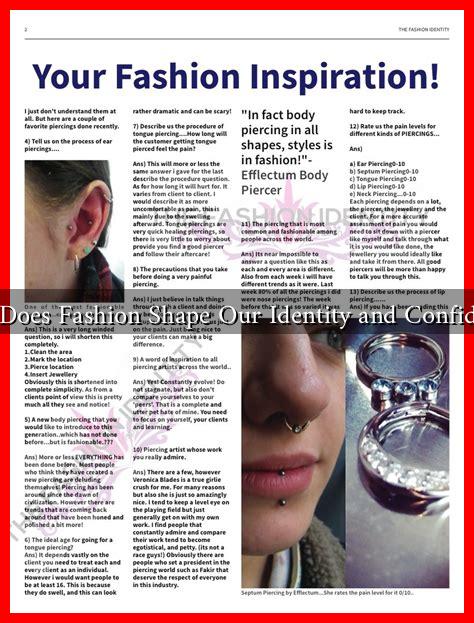-
Table of Contents
How Does Fashion Shape Our Identity and Confidence?
Fashion is more than just clothing; it is a powerful form of self-expression that can significantly influence our identity and confidence. From the way we dress to the brands we choose, fashion plays a crucial role in how we perceive ourselves and how others perceive us. This article explores the intricate relationship between fashion, identity, and confidence, supported by research, examples, and statistics.
The Role of Fashion in Identity Formation
Fashion serves as a canvas for individuals to express their personalities, beliefs, and cultural backgrounds. The clothes we wear can communicate a multitude of messages about who we are. Here are some ways fashion contributes to identity formation:
- Personal Expression: Fashion allows individuals to showcase their unique styles. For instance, someone who prefers vintage clothing may identify with a nostalgic or retro aesthetic.
- Cultural Representation: Traditional attire can signify cultural heritage. For example, wearing a kimono in Japan or a sari in India can express pride in one’s cultural identity.
- Social Groups: Fashion can signify belonging to a particular social group. For instance, punk fashion with its leather jackets and band tees can indicate affiliation with the punk subculture.
According to a study published in the journal *Psychology of Popular Media Culture*, individuals often use clothing to communicate their social identity, which can enhance their sense of belonging and self-worth.
Fashion and Confidence: The Psychological Connection
The clothes we wear can significantly impact our self-esteem and confidence levels. Research has shown that dressing well can lead to improved mood and self-perception. Here are some key points illustrating this connection:
- Power Dressing: The concept of “power dressing” suggests that wearing certain types of clothing can enhance feelings of authority and confidence. For example, a well-tailored suit can make an individual feel more competent in a professional setting.
- Color Psychology: Colors can evoke emotions and influence perceptions. Wearing bold colors like red can boost confidence, while softer colors may promote calmness.
- Body Image: Fashion can also affect how individuals perceive their bodies. Wearing clothes that fit well and make one feel good can enhance body positivity and self-acceptance.
A study conducted by the *Journal of Experimental Social Psychology* found that participants who wore formal clothing performed better on cognitive tasks, suggesting that fashion can influence not just how we feel but also how we think.
Case Studies: Fashion Icons and Their Impact
Throughout history, various fashion icons have shaped societal norms and influenced individual identities. Here are a few notable examples:
- Audrey Hepburn: Known for her classic style, Hepburn’s fashion choices in films like *Breakfast at Tiffany’s* have inspired generations, promoting elegance and femininity.
- David Bowie: Bowie’s ever-changing style and gender-fluid fashion challenged traditional norms, encouraging individuals to embrace their uniqueness and express their identities freely.
- Beyoncé: As a cultural icon, Beyoncé uses fashion to convey messages of empowerment and self-love, influencing her fans to embrace their identities confidently.
These icons demonstrate how fashion can transcend mere aesthetics, becoming a powerful tool for social change and personal empowerment.
Conclusion: The Lasting Impact of Fashion on Identity and Confidence
Fashion is a dynamic force that shapes our identities and influences our confidence levels. By allowing individuals to express their unique personalities, cultural backgrounds, and social affiliations, fashion plays a vital role in identity formation. Moreover, the psychological effects of clothing choices can enhance self-esteem and promote a positive self-image.
As we navigate the complexities of modern life, understanding the impact of fashion on our identities can empower us to make choices that reflect our true selves. Whether through personal style or cultural representation, fashion remains a significant aspect of who we are and how we present ourselves to the world.
For further reading on the psychological effects of fashion, you can explore resources like the Psychology Today article on the psychology of fashion.



